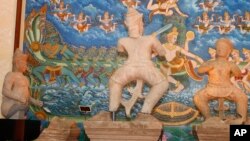Art can represent a nation’s identity, and younger generations have a responsibility to conserve it. But that means education, to help youth appreciate art and culture, says Donna Strahan, head of conservation and research at the Freer-Sackler Gallery.
Strahan recently spoke at the Metropolitan Museum to discuss ancient Cambodian innovations in bronze in the 11th century.
“I think it is very important to preserve your own culture, your ancient culture, so that young people can learn and see where their ancestors came from,” she said in an interview afterward.
Without art conservation, much will be lost, she said. “You will lose your cultural heritage. You won't have any knowledge of what your ancient ancestors were doing. I think it would be very, very sad to lose that culture, so a nation should preserve it.”
The preservation of Cambodian art has been a challenge, following the Khmer Rouge and decades of civil strife that followed. But these days, it is getting more attention.
“Now they seem to be very concerned and very interested in getting people educated with museum backgrounds, and understanding how to preserve the culture, how to run a museum, how to keep things safe,” she said.
But educating a younger generation is also important, she said, to help them appreciate their own cultural art.
“I think that the children need to learn how important their cultural heritage is, and that way they will learn to respect it and they will not be, I hope, digging into the ground, looting, and selling it, but instead they will be helping archeologists to do scientific studies to find the art, to study the culture instead of destroying the culture,” she said.
Despite its rich cultural heritage, which includes Angkor Wat and temples like Preah Vihear, Cambodia has not typically paid much attention to preserving its art, Cheng Nerou, a Cambodian-American member of Friends of Khmer Culture, in the US, said. His association always finds donors abroad to support art preservation activities in Cambodia, he said.
“I think our country is not putting enough empathy and energy into really appreciating it enough to put money in it,” he said. “So here you have funders that care more about conserving our art and culture than in Cambodia.”
He too said Cambodia could do more to instill art appreciation in its students.
“We need to kind of say hey, start from our children through education from kindergarten all the way to high school,” he said.







